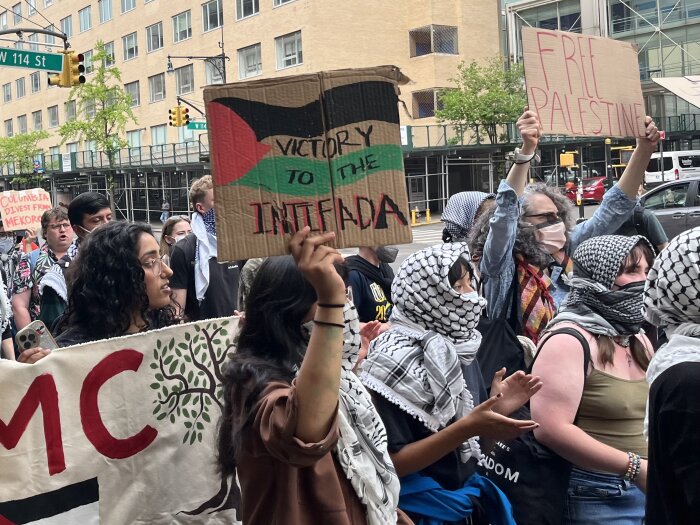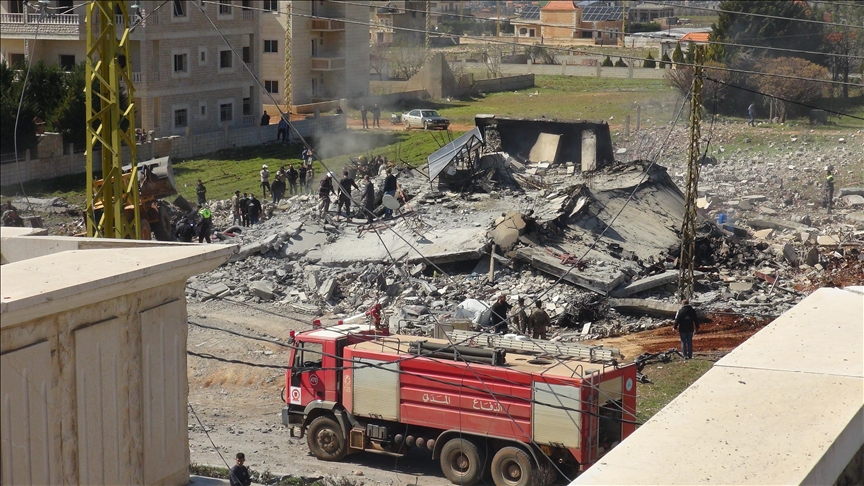The marchers also chanted anti-Palestinian, anti-Arab and anti-Muslim slogans outside of the Damascus Gate.

Israeli right-wing activists gather with Israeli national flags outside the Damascus Gate of the old city of Jerusalem [Menahem Kahana / AFP]
AL JAZEERA
Published On 5 Jun 2024
Thousands of mostly ultranationalist Israelis have taken part in an annual march through a Palestinian neighbourhood in Jerusalem’s Old City, with some marchers chanting “Death to Arabs.”
Jerusalem has been mostly calm throughout Israel’s war on Gaza, but the march could ignite widespread tensions, as it did three years ago, when it helped set off an 11-day war in Gaza.
Marchers gathered outside the Damascus Gate, typically a central gathering place for Palestinians in occupied East Jerusalem, and chanted anti-Arab and anti-Islamic slogans, danced and waved Israeli flags as the procession kicked off.
Just before the march began, crowds scuffled with police and threw plastic bottles at a journalist wearing a vest with the word PRESS emblazoned on it. Some chanted “Muhammad is dead!” referring to the Islamic prophet.
The march was taking place as tensions over the Israel-Hamas war in Gaza were high.
The annual march commemorates “Jerusalem Day”, which marks Israel’s capture of East Jerusalem, including the Old City and its holy sites sacred to Jews, Christians and Muslims, in the 1967 Middle East war. Israel considers all of Jerusalem to be its capital, but its annexation of East Jerusalem is not internationally recognised. The Palestinians, who seek East Jerusalem as the capital of a future state, see the march as a provocation.
In previous years, police have forcibly cleared Palestinians from the parade route, and large crowds of mostly ultranationalist youths have chanted “Death to Arabs,” “May your village burn” and other offensive slogans. The police said they were deploying 3,000 security personnel to ensure calm.
At the insistence of Israel’s far-right National Security Minister Itamar Ben-Gvir, who oversees the police, the march will follow its traditional route, entering the Muslim Quarter of the Old City through Damascus Gate and ending at the Western Wall, the holiest place where Jews can pray.
As buses bringing young Jewish men in for the march thronged around the Old City’s centuries-old walls, Palestinian shopkeepers closed down in the Muslim Quarter in preparation.
The police stressed that the march would not enter the sprawling Al-Aqsa Mosque compound, the third-holiest site in Islam.
 Israeli border police officers look at Israelis during a march marking Jerusalem Day, in Jerusalem's Old City. [Ohad Zwigenberg/AP Photo]
Israeli border police officers look at Israelis during a march marking Jerusalem Day, in Jerusalem's Old City. [Ohad Zwigenberg/AP Photo]
Advertisement

Published On 5 Jun 2024
Thousands of mostly ultranationalist Israelis have taken part in an annual march through a Palestinian neighbourhood in Jerusalem’s Old City, with some marchers chanting “Death to Arabs.”
Jerusalem has been mostly calm throughout Israel’s war on Gaza, but the march could ignite widespread tensions, as it did three years ago, when it helped set off an 11-day war in Gaza.
Marchers gathered outside the Damascus Gate, typically a central gathering place for Palestinians in occupied East Jerusalem, and chanted anti-Arab and anti-Islamic slogans, danced and waved Israeli flags as the procession kicked off.
Just before the march began, crowds scuffled with police and threw plastic bottles at a journalist wearing a vest with the word PRESS emblazoned on it. Some chanted “Muhammad is dead!” referring to the Islamic prophet.
The march was taking place as tensions over the Israel-Hamas war in Gaza were high.
The annual march commemorates “Jerusalem Day”, which marks Israel’s capture of East Jerusalem, including the Old City and its holy sites sacred to Jews, Christians and Muslims, in the 1967 Middle East war. Israel considers all of Jerusalem to be its capital, but its annexation of East Jerusalem is not internationally recognised. The Palestinians, who seek East Jerusalem as the capital of a future state, see the march as a provocation.
In previous years, police have forcibly cleared Palestinians from the parade route, and large crowds of mostly ultranationalist youths have chanted “Death to Arabs,” “May your village burn” and other offensive slogans. The police said they were deploying 3,000 security personnel to ensure calm.
At the insistence of Israel’s far-right National Security Minister Itamar Ben-Gvir, who oversees the police, the march will follow its traditional route, entering the Muslim Quarter of the Old City through Damascus Gate and ending at the Western Wall, the holiest place where Jews can pray.
As buses bringing young Jewish men in for the march thronged around the Old City’s centuries-old walls, Palestinian shopkeepers closed down in the Muslim Quarter in preparation.
The police stressed that the march would not enter the sprawling Al-Aqsa Mosque compound, the third-holiest site in Islam.
 Israeli border police officers look at Israelis during a march marking Jerusalem Day, in Jerusalem's Old City. [Ohad Zwigenberg/AP Photo]
Israeli border police officers look at Israelis during a march marking Jerusalem Day, in Jerusalem's Old City. [Ohad Zwigenberg/AP Photo]Advertisement

Israeli right-wing activists assault Palestinian freelance journalist Saif Kwasmi during the march. [Hazem Bader/AFP]


Police typically force the closure of Palestinian businesses near the march route and keep Palestinian residents away. [Marko Djurica/Reuters]
 For many Palestinians, the route through predominantly Arab neighbourhoods is seen as a deliberate provocation. The Palestinians want the city's eastern sector as the capital of their future state. [Ronen Zvulun/Reuters]
For many Palestinians, the route through predominantly Arab neighbourhoods is seen as a deliberate provocation. The Palestinians want the city's eastern sector as the capital of their future state. [Ronen Zvulun/Reuters]

 For many Palestinians, the route through predominantly Arab neighbourhoods is seen as a deliberate provocation. The Palestinians want the city's eastern sector as the capital of their future state. [Ronen Zvulun/Reuters]
For many Palestinians, the route through predominantly Arab neighbourhoods is seen as a deliberate provocation. The Palestinians want the city's eastern sector as the capital of their future state. [Ronen Zvulun/Reuters]
A man carries his child while Israelis participate in the annual Jerusalem Day march. [Marko Djurica/Reuters]


Israeli police officers separate Israelis and Palestinians in a street in the Muslim Quarter of Jerusalem's Old City. [Ohad Zwigenberg/AP Photo]


In previous years, thousands of mainly religious nationalists walk through predominantly Arab neighbourhoods of the Old City, waving Israeli national flags, dancing and occasionally shouting inflammatory or racist slogans. [Ammar Awad/Reuters]


Most shops in the Old City were closed before the march started as streets slowly emptied of Palestinians and filled with young Israelis. [Marko Djurica/Reuters]


A clown blows bubbles as Israeli border police gather during the annual Jerusalem Day march in Jerusalem's Old City. [Marko Djurica/Reuters]
Chants of 'death to Arabs' heard as Israeli protesters march through Jerusalem
Lucy Jackson
Wed, 5 June 2024
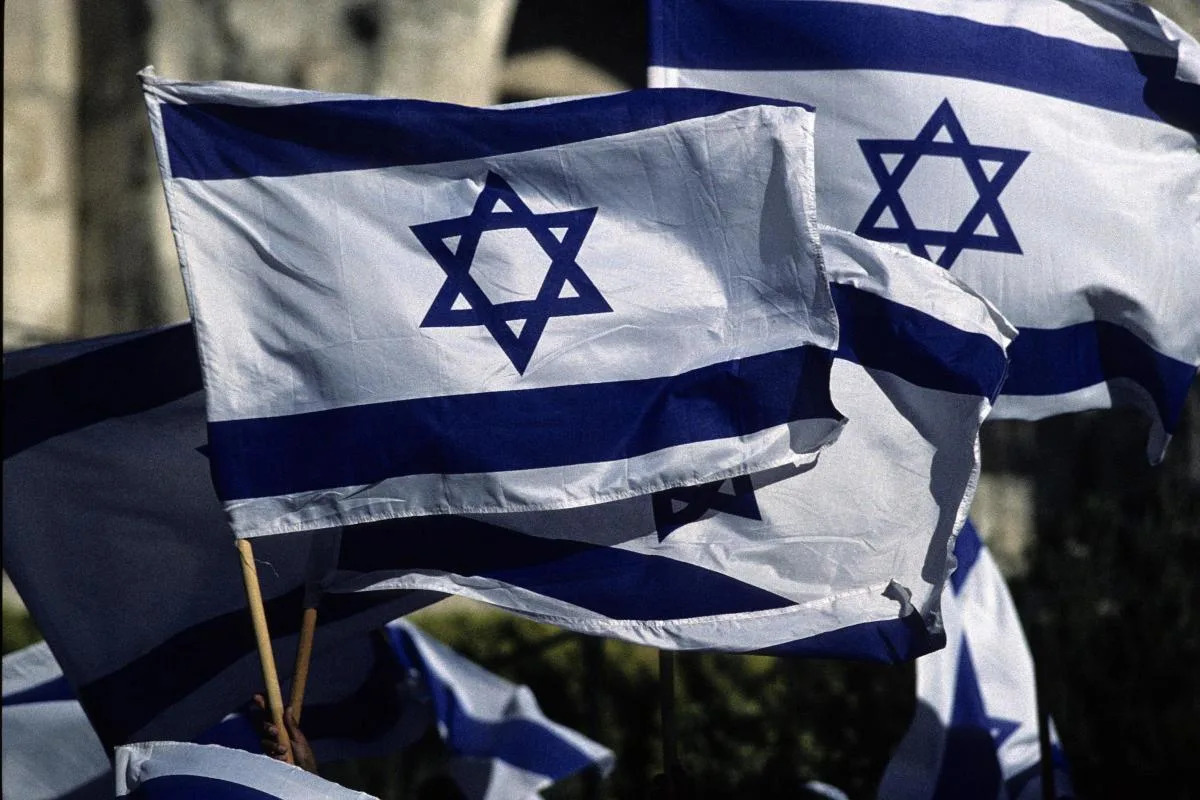
Thousands of Israelis, including many ultranationalists, were taking part in the 'Jerusalem Day' march
ISRAELI participants in a nationalist march through a Palestinian area of Jerusalem chanted “Death to Arabs” on Wednesday, stoking already surging tensions as Israel’s offensive in Gaza continues.
Thousands of Israelis, including many ultranationalists, were taking part in the “Jerusalem Day” march.
The annual event marks Israel’s capture of east Jerusalem, including the Old City and its holy sites sacred to Jews, Christians and Muslims, in the 1967 Middle East war.
READ MORE: BBC 'shamefully' omits SNP from series on party leaders at General Election
The marchers also chanted anti-Islamic slogans outside the Damascus Gate, a central gathering place for Palestinians in east Jerusalem.
The march in the past has helped fuel violence, including helping to set off an 11-day war with Hamas three years ago.
Palestinians view the annual march as provocative.
Just before the march began, crowds scuffled with police and threw plastic bottles at a Palestinian journalist wearing a Press vest.
Reports have also emerged of an Israeli journalist being knocked to the ground and kicked until Border Police intervened.
It comes as the Israeli military said it has started “operational activity” in two areas of central Gaza in a possible broadening of its ground offensive against Hamas.
READ MORE: Anas Sarwar says immigration 'too high' as he 'takes marching orders from London'
The military said its forces are operating “both above and below ground” in eastern parts of Deir al-Balah and Bureij, a built-up Palestinian refugee camp dating back to the 1948 war surrounding Israel’s creation.
It said the operation began with air strikes on militant infrastructure, after which troops began a “targeted daylight operation” in both areas.
The most recent death toll stands at more than 36,000 people killed, as Gaza’s Health Ministry said 36 people were killed and 115 injured in the latest 24-hour reporting period.
Meanwhile, the United Nations (UN) has warned that if the current escalation of conflict continues unabated, more than one million Palestinians in Gaza could suffer the highest level of starvation by mid-July.
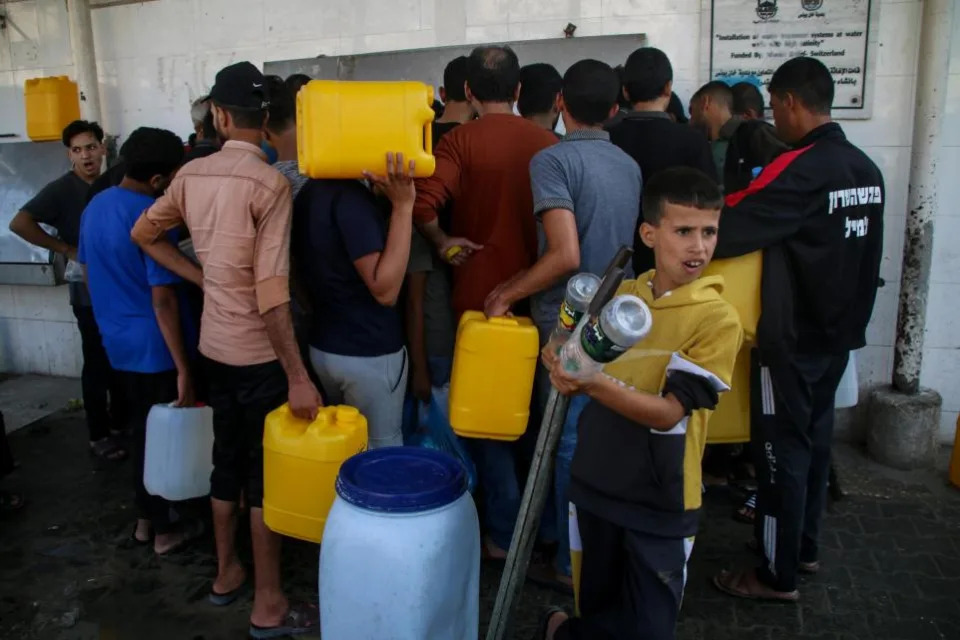
The National:
This would be an increase from 677,000 people who were believed to be experiencing famine-level conditions in March.
International mediators are waiting for Israel and Hamas to respond to a new ceasefire and hostage release proposal, according to Qatar, which has played a key role in negotiations alongside Egypt and the United States.
Announcing the proposal last week, US President Joe Biden said the three-phase plan was Israeli.
However, Israeli leaders have since appeared to distance themselves from the proposal and vowed to keep fighting Hamas until the group is destroyed.
Israeli nationalists march in Jerusalem as a far-right minister boasts of Jewish prayer at key site
JULIA FRANKEL and MOSHE EDRI
Updated Wed, 5 June 2024
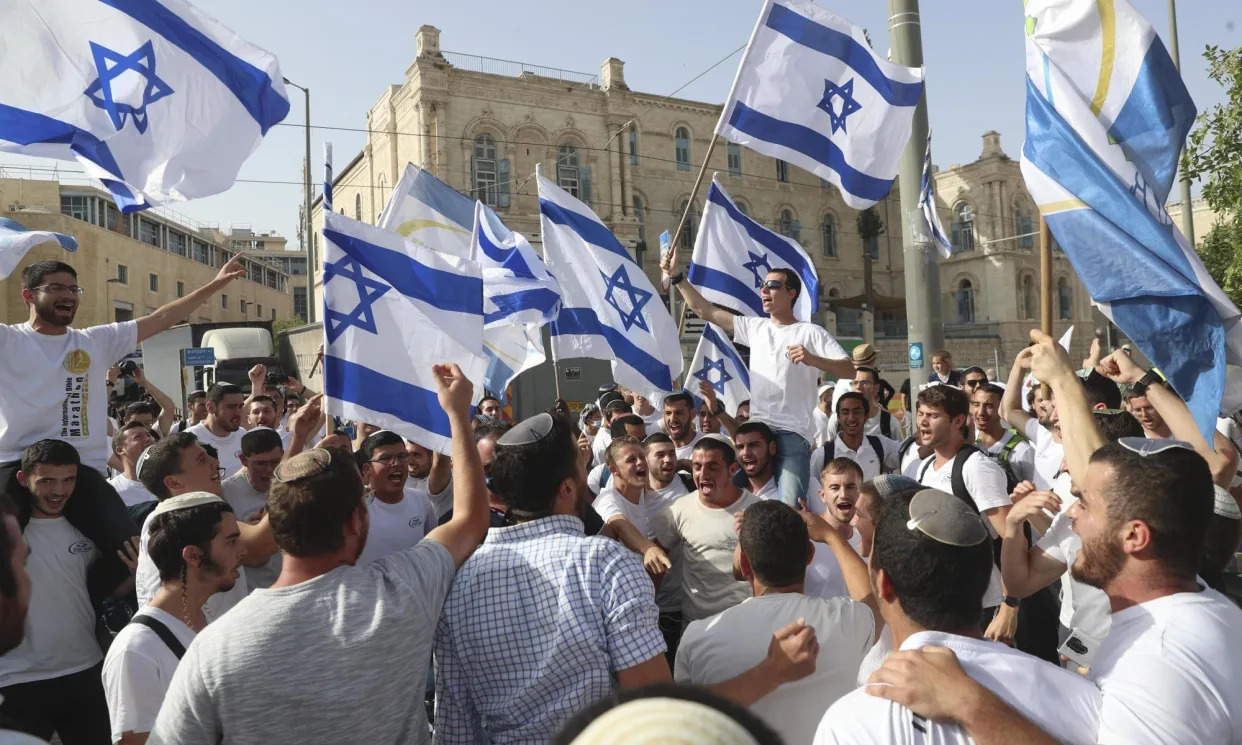
In 2021, violence on the parade day contributed to the outbreak of an 11-day war between Israel and Hamas.Photograph: Ariel Schalit/AP
Bethan McKernan in Jerusalem
Wed, 5 June 2024
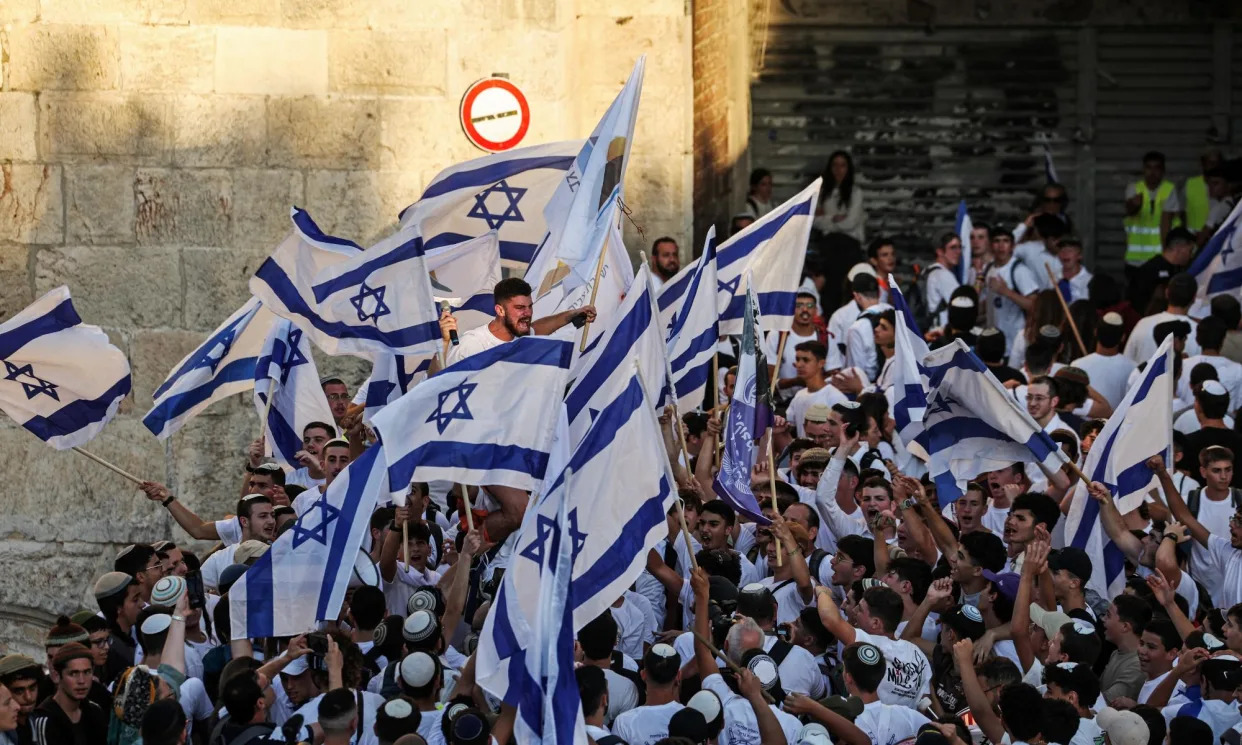
Israelis participating in the march at the Damascus Gate.Photograph: Ronen Zvulun/Reuters
Thousands of Israeli religious nationalists have paraded through Muslim parts of the Old City of Jerusalem in the annual Flag Day march, an event that threatens to trigger further violence in the Israel-Hamas war.
The march, in which Israelis enter the Muslim quarter through the highly symbolic Damascus Gate and walk to the Western Wall waving the national flag, takes place around sunset on what Israel calls Jerusalem Day, marking the capture and occupation of the eastern half of the city and its holy sites in the war of 1967. Control of Jerusalem is at the centre of the decades-old conflict, and the Israeli takeover is not recognised internationally.
The parade is often marred by anti-Arab hate speech and vandalism of Palestinian property, as well as violent clashes between marchers and Palestinian residents of the Old City, who see it as deeply provocative. Violence at the same event three years ago helped spark the 11-day war between Israel and Hamas in 2021.
Hamas warned Israel in a statement on Wednesday “against the consequences of continuing these criminal policies against our sanctities, at the heart of which is the blessed al-Aqsa mosque”, urging Palestinians to take part in a “day of anger”.
Related: Netanyahu threatens ‘extremely powerful’ response to Hezbollah attacks
But after teenagers and young men wearing Jewish religious-nationalist clothing, some of them army reservists carrying pistols and rifles, began to arrive at Damascus Gate in the early afternoon on Wednesday, Palestinian residents began to close up their businesses and retreat to the safety of their homes, shuttering doors and windows.
Several clashes between marchers and Palestinians, leftwing Israeli activists and journalists were reported as the afternoon wore on, despite a heavy police presence of 3,000 uniformed and plainclothes officers. Jeers of “Death to Arabs” and “May your village burn” rang through the stone walls of the Old City as marchers chanted and danced.
Ori, 18, attending the parade, said: “These guys are Christians and Muslims. They don’t like us and we don’t like them. Today is about celebrating the return of the Jews to Jerusalem after 2,000 years. We are showing them who owns this place.”
Adil, a 71-year-old Palestinian taking the long way home through the maze of narrow streets to avoid the parade route, said: “Every year this is difficult, but this year is even harder … Everyone is scared.”
This year, the Jerusalem Day parade is under the control of Israel’s far-right and anti-Arab national security minister, Itamar Ben-Gvir, in his role as head of police. He was expected to join the celebrations towards their culmination at sunset.
He told Army Radio on Tuesday: “We will march … and Jews will go up to the Temple Mount. All the generals in Gaza tell me that every house they enter they see the Temple Mount, so they should be hit in the place that is most important to them.”
The Temple Mount, known as al-Haram al-Sharif or al-Aqsa in Arabic, a raised, walled complex in the heart of the Old City, is the holiest site in Judaism and third holiest in Islam. It has long been a flashpoint for violence, but has remained unusually quiet since the war broke out in October as Israel has allowed only Palestinian men over 55 and women over 50 to access the site. The traditional Jerusalem Day parade route does not pass through it.
Under a longstanding compromise agreement, Jews are allowed to visit, but not pray there. In recent years, however, growing numbers of Jewish visitors, sometimes praying or with police escorts, have inflamed longstanding Palestinian fears that Israel plans to annex the area. Ben-Gvir’s Jewish Power party advocates for Jewish sovereignty over the site.
Naomi, 22, said: “I wouldn’t come here on a normal day because it isn’t so secure, but I always come on Jerusalem Day. This year it is more meaningful than ever.”
Estimated attendance figures for the march were not immediately available, but the numbers seemed set to exceed the unusually high turnout of 70,000 people in 2022. Police said 1,500 Jews had visited the Temple Mount by 5pm – far more than usual – and that five people had been arrested for attacking journalists.
Some Jewish visitors to Temple Mount were arrested for attempting to bow down in prayer, police said, without giving details. Clashes between Israelis and Palestinians in the nearby volatile East Jerusalem neighbourhood of Silwan also broke out during the afternoon.
About 1,200 Israelis were killed and another 250 taken hostage in Hamas’s 7 October attack, which triggered the latest war between the two sides. More than 36,000 Palestinians have been killed in Israel’s ensuing retaliatory operation in Gaza.
A new ceasefire and hostage deal presented by Joe Biden has been presented by mediators to Hamas, but it is unclear whether much progress has been made, as the two sides are still far apart on issues such as the withdrawal of Israeli troops and the end of Hamas’ rule in the Gaza Strip. An initial truce in November broke down after a week.
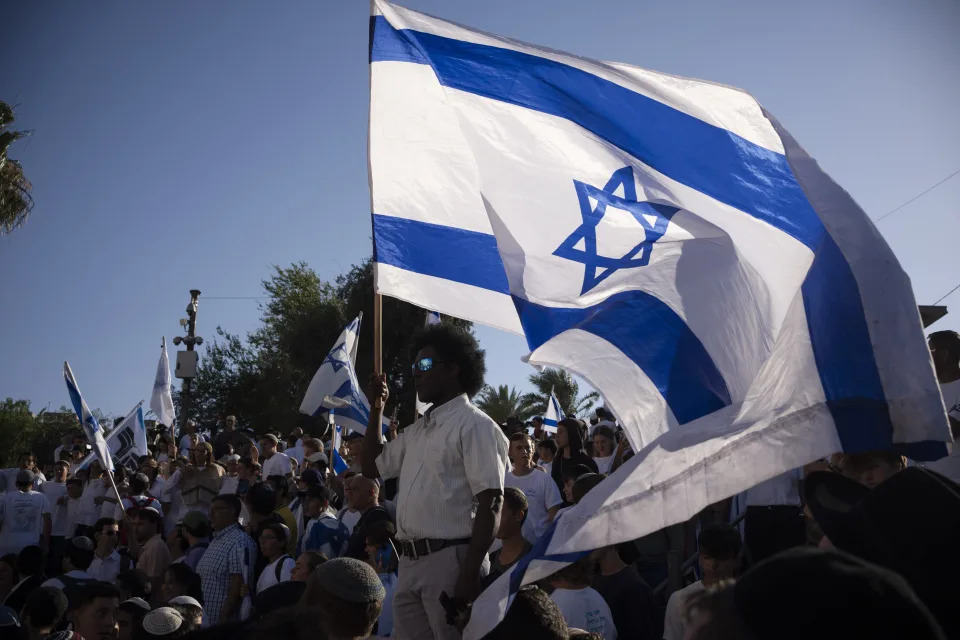
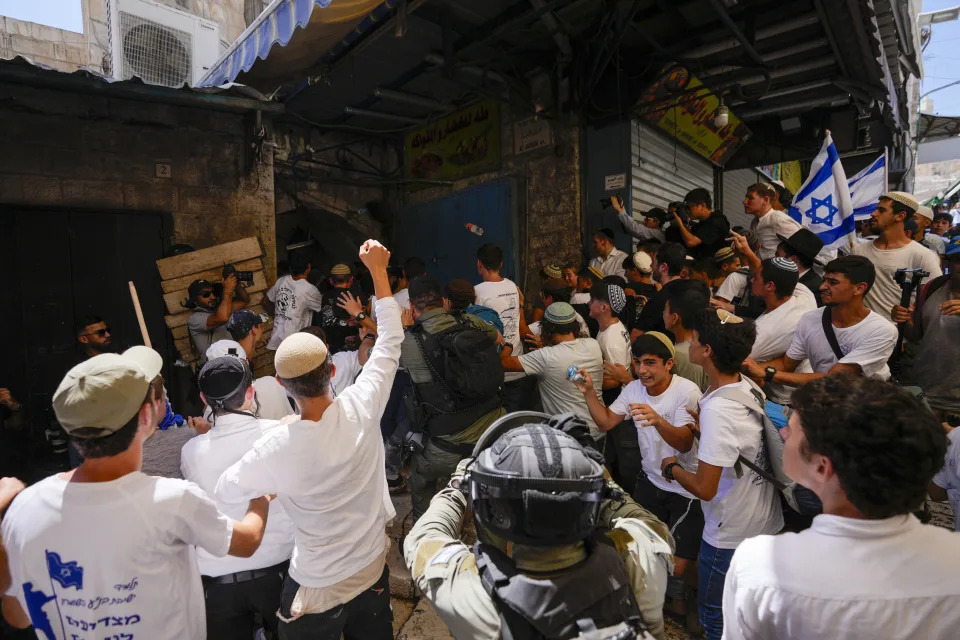
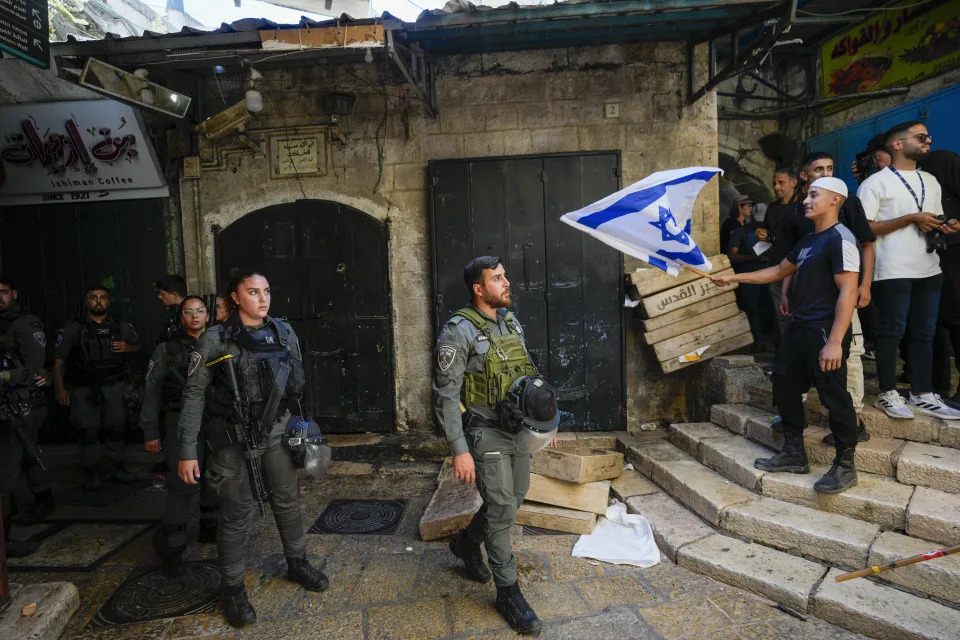
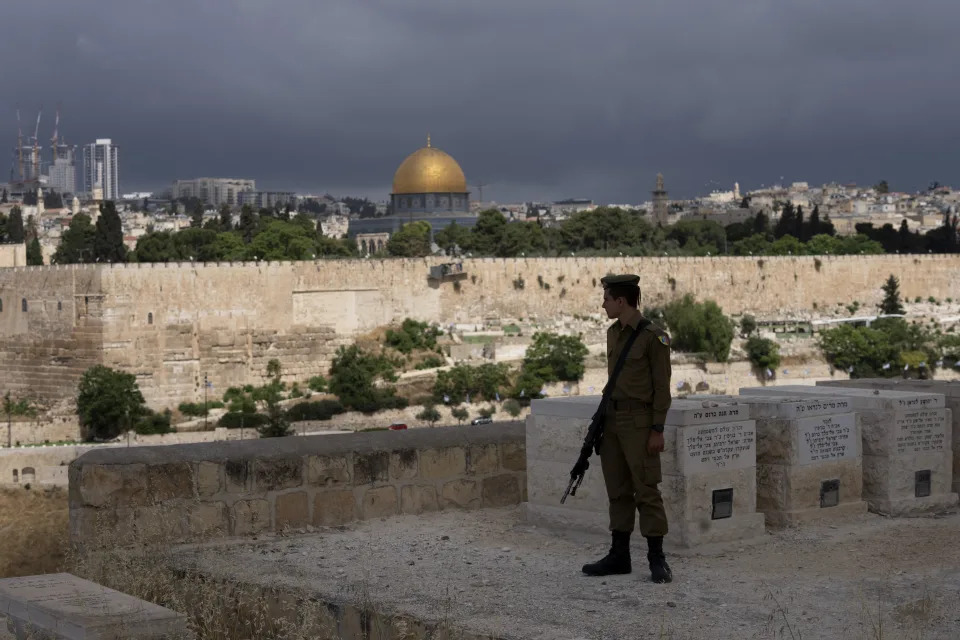
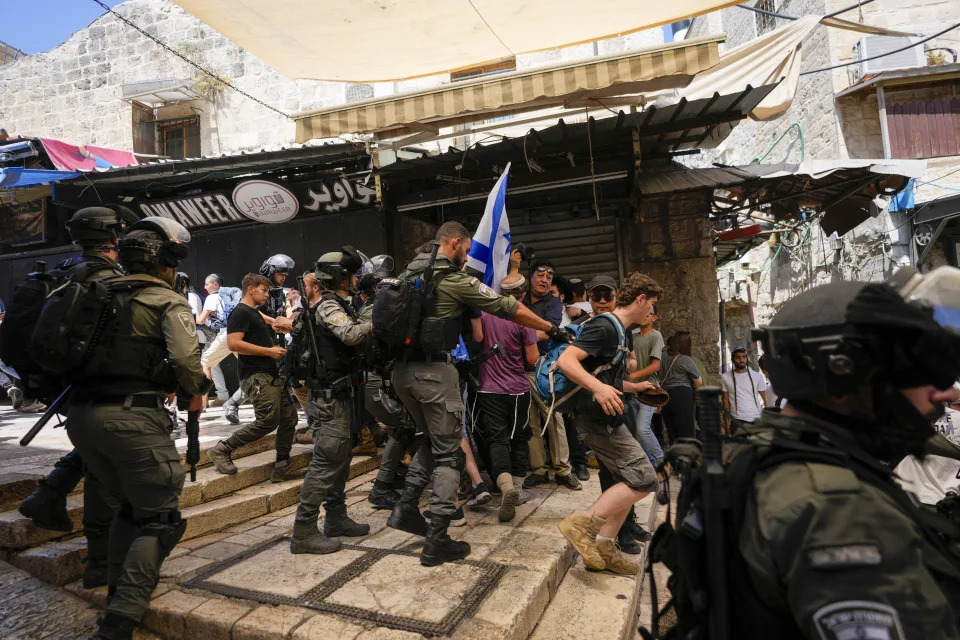
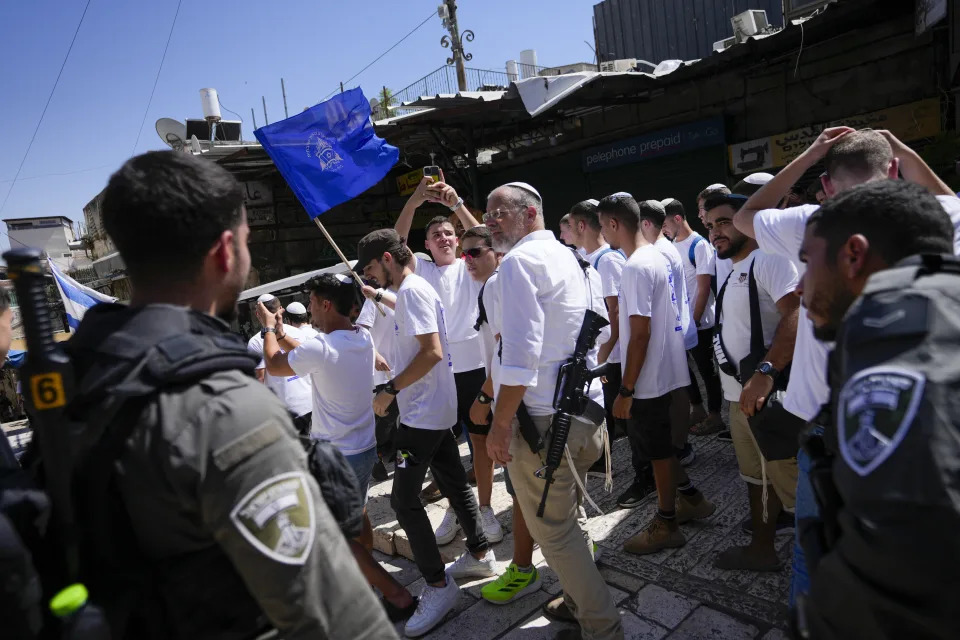
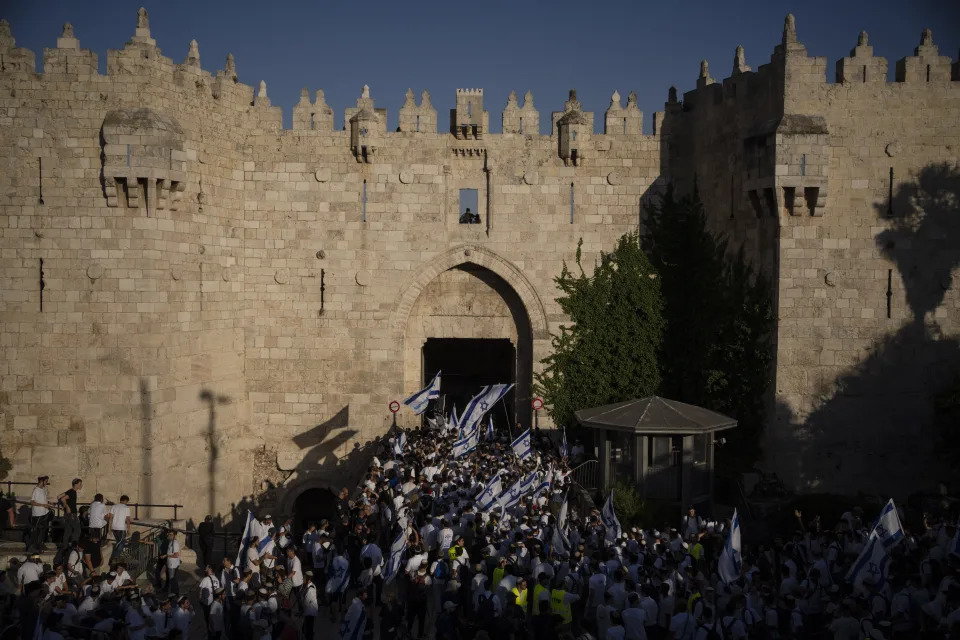
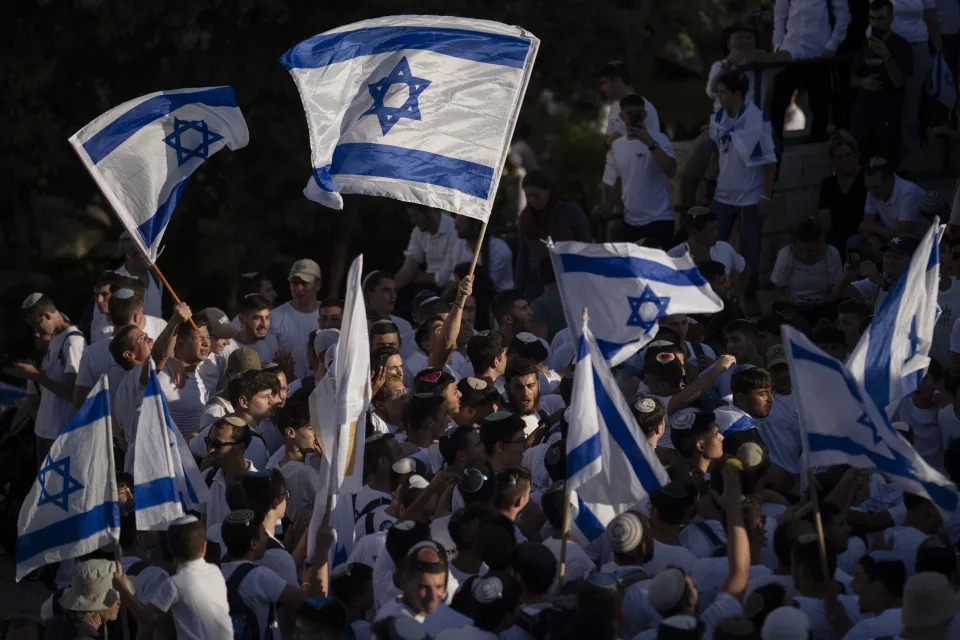
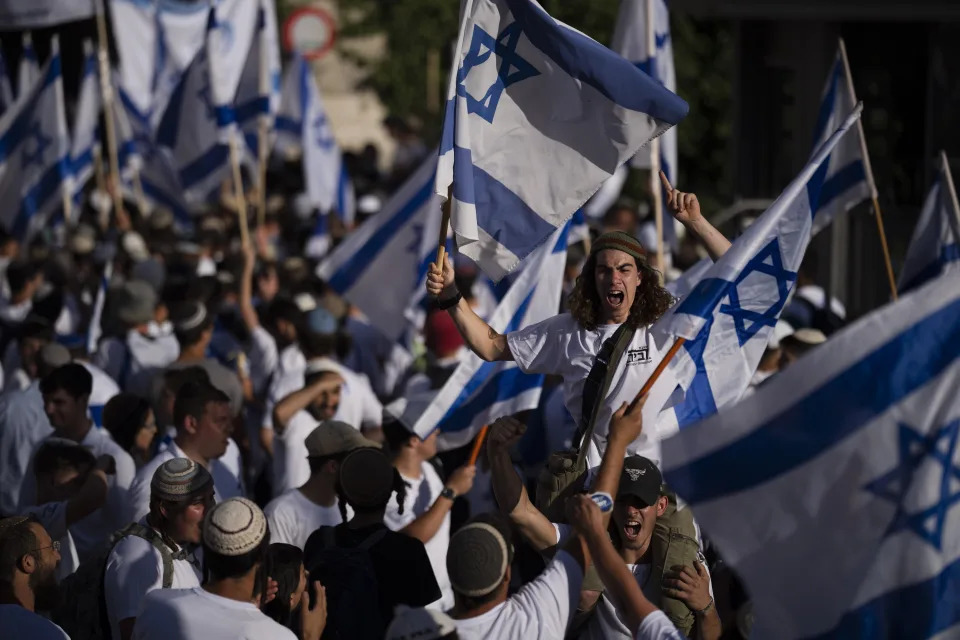
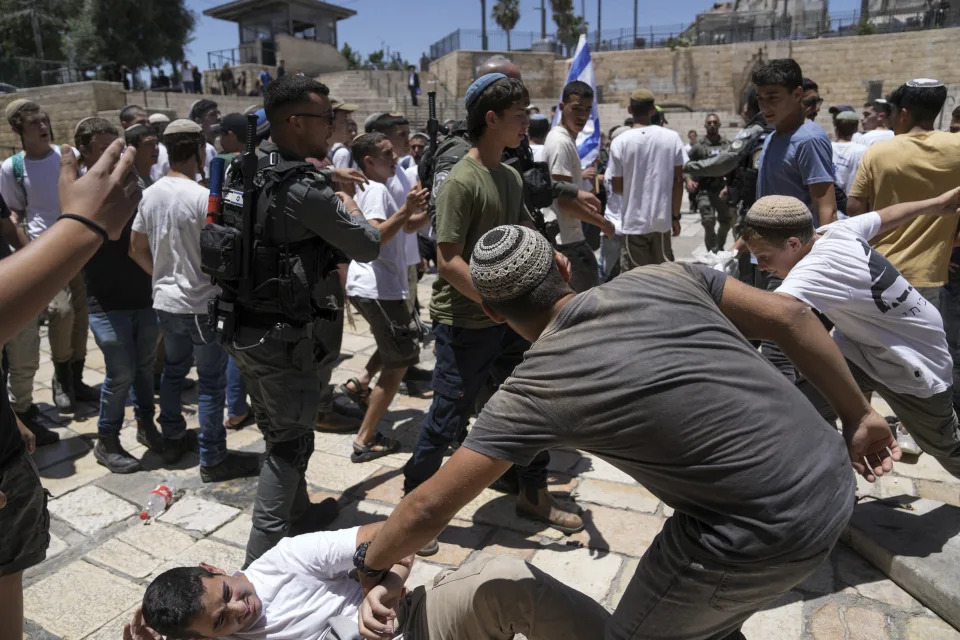
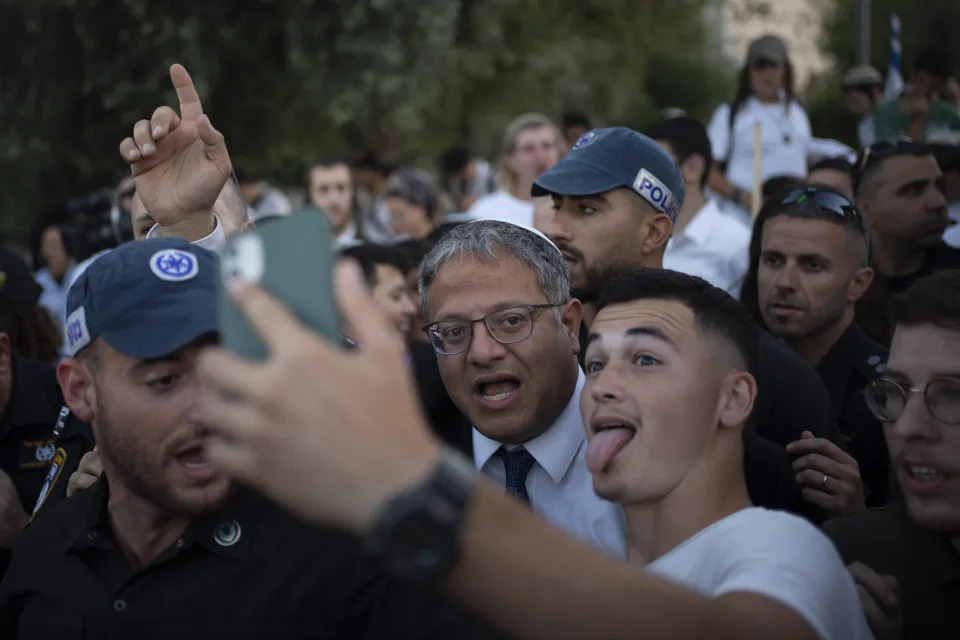
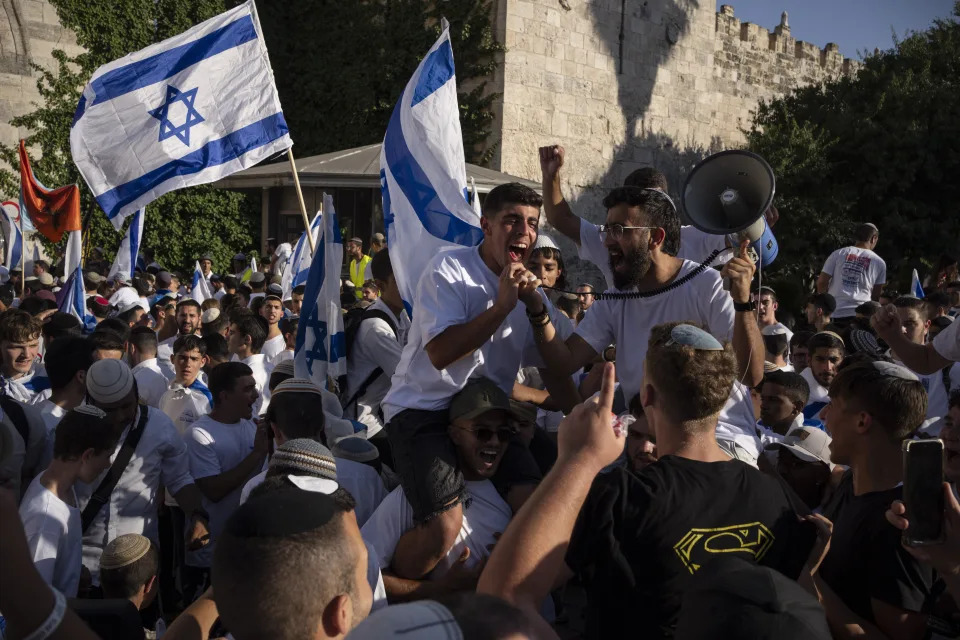
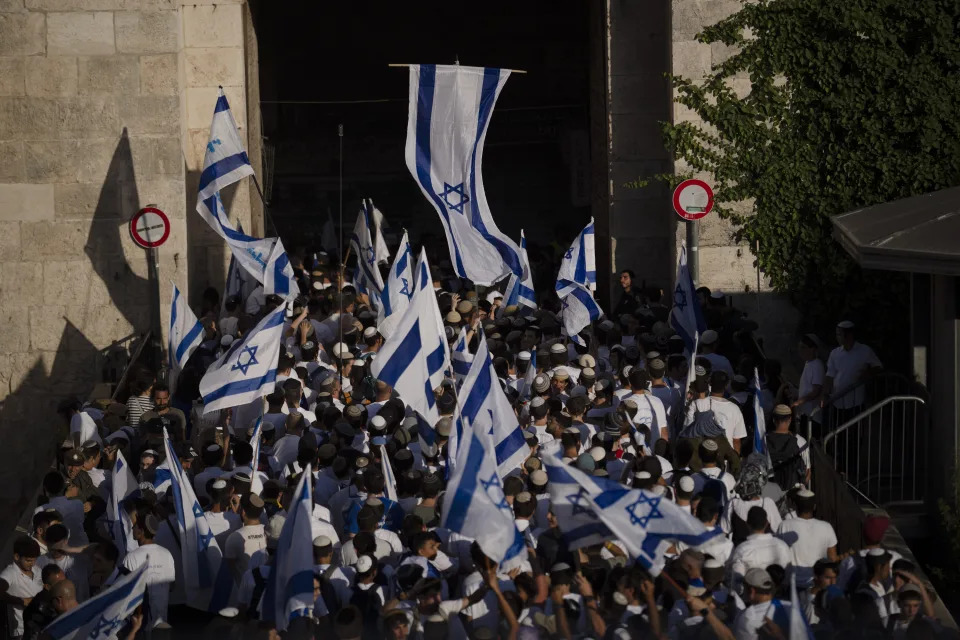
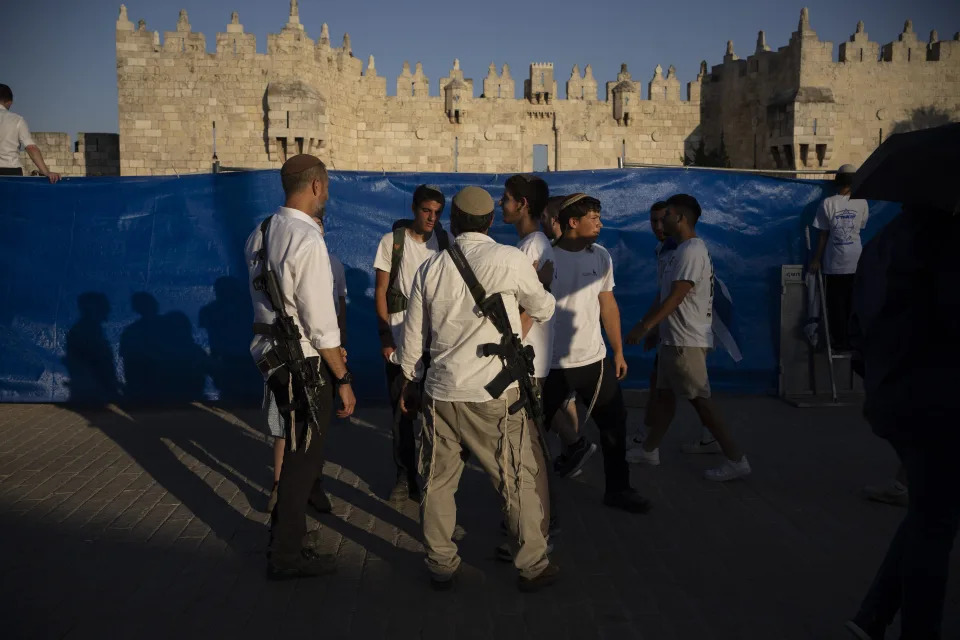
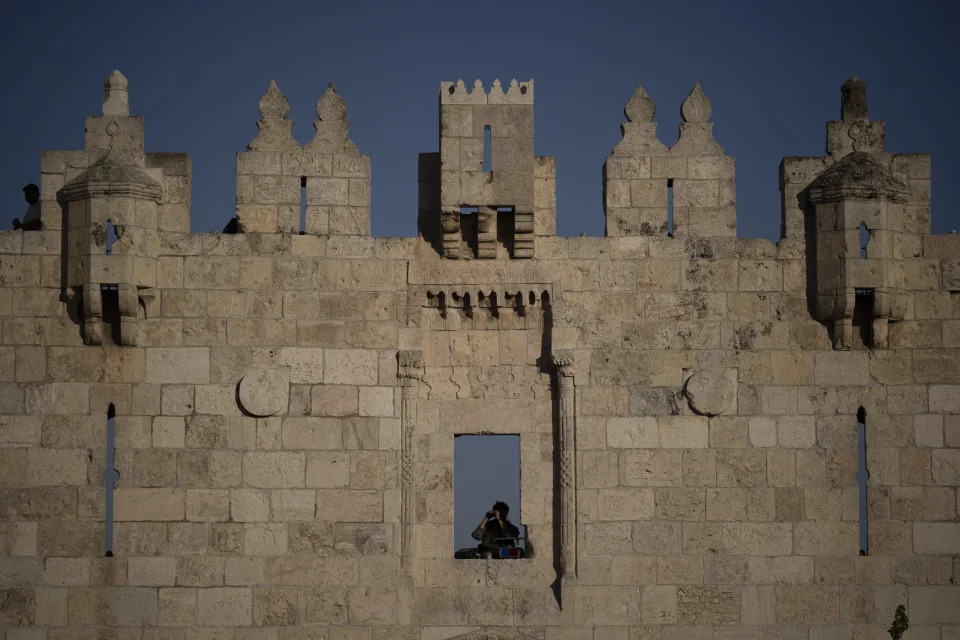
Israelis wave national flags during a march marking Jerusalem Day, an Israeli holiday celebrating the capture of east Jerusalem in the 1967 Mideast war, in front of the Damascus Gate of Jerusalem's Old City, Wednesday, June 5, 2024.
Lucy Jackson
Wed, 5 June 2024

Thousands of Israelis, including many ultranationalists, were taking part in the 'Jerusalem Day' march
ISRAELI participants in a nationalist march through a Palestinian area of Jerusalem chanted “Death to Arabs” on Wednesday, stoking already surging tensions as Israel’s offensive in Gaza continues.
Thousands of Israelis, including many ultranationalists, were taking part in the “Jerusalem Day” march.
The annual event marks Israel’s capture of east Jerusalem, including the Old City and its holy sites sacred to Jews, Christians and Muslims, in the 1967 Middle East war.
READ MORE: BBC 'shamefully' omits SNP from series on party leaders at General Election
The marchers also chanted anti-Islamic slogans outside the Damascus Gate, a central gathering place for Palestinians in east Jerusalem.
The march in the past has helped fuel violence, including helping to set off an 11-day war with Hamas three years ago.
Palestinians view the annual march as provocative.
Just before the march began, crowds scuffled with police and threw plastic bottles at a Palestinian journalist wearing a Press vest.
Reports have also emerged of an Israeli journalist being knocked to the ground and kicked until Border Police intervened.
It comes as the Israeli military said it has started “operational activity” in two areas of central Gaza in a possible broadening of its ground offensive against Hamas.
READ MORE: Anas Sarwar says immigration 'too high' as he 'takes marching orders from London'
The military said its forces are operating “both above and below ground” in eastern parts of Deir al-Balah and Bureij, a built-up Palestinian refugee camp dating back to the 1948 war surrounding Israel’s creation.
It said the operation began with air strikes on militant infrastructure, after which troops began a “targeted daylight operation” in both areas.
The most recent death toll stands at more than 36,000 people killed, as Gaza’s Health Ministry said 36 people were killed and 115 injured in the latest 24-hour reporting period.
Meanwhile, the United Nations (UN) has warned that if the current escalation of conflict continues unabated, more than one million Palestinians in Gaza could suffer the highest level of starvation by mid-July.

The National:
This would be an increase from 677,000 people who were believed to be experiencing famine-level conditions in March.
International mediators are waiting for Israel and Hamas to respond to a new ceasefire and hostage release proposal, according to Qatar, which has played a key role in negotiations alongside Egypt and the United States.
Announcing the proposal last week, US President Joe Biden said the three-phase plan was Israeli.
However, Israeli leaders have since appeared to distance themselves from the proposal and vowed to keep fighting Hamas until the group is destroyed.
Israeli nationalists march in Jerusalem as a far-right minister boasts of Jewish prayer at key site
JULIA FRANKEL and MOSHE EDRI
Updated Wed, 5 June 2024

In 2021, violence on the parade day contributed to the outbreak of an 11-day war between Israel and Hamas.Photograph: Ariel Schalit/AP
JERUSALEM (AP) — Thousands of ultranationalist Israelis marched through a sensitive Palestinian area of Jerusalem on Wednesday in an annual procession, chanting racist slogans as the country’s far-right national security minister boasted that Jews had prayed freely at a key holy site in the city in violation of decades-old understandings.
The comments by Itamar Ben-Gvir and the march in Jerusalem, the emotional heart of the Israeli-Palestinian conflict, threatened to stoke already high tensions that have gripped the region since the start of the war in Gaza. The annual march, seen by Palestinians as provocative, helped set off an 11-day war in Gaza three years ago.
Marchers convening outside the Damascus Gate of Jerusalem’s historic Old City, a central gathering place for Palestinians in east Jerusalem, chanted “Death to Arabs” and other anti-Arab and anti-Islamic slogans. They danced and waved Israeli flags as the procession kicked off.
Ben-Gvir, who was once on the fringes of Israeli politics but now holds a key position in Prime Minister Benjamin Netanyahu’s government, had insisted that the march follow its traditional route through the Palestinian area, despite tensions surging because of the war. Marchers entered the Muslim Quarter of the Old City through Damascus Gate and ended at the Western Wall, the holiest place where Jews can pray.
The police stressed that the march would not enter the sprawling Al-Aqsa mosque compound, the third holiest site in Islam. The hilltop on which it stands is the holiest site for Jews, who refer to it as the Temple Mount because it was the location of the Jewish temples in antiquity.
But activists said hundreds of Jews had visited the compound earlier in the day, and Ben-Gvir said they prayed there freely, following what he said was his own policy that permitted prayer there.
Since Israel captured the site in 1967, Jews have been allowed to visit but not pray there. Perceived encroachments on the site have set off widespread violence on a number of occasions going back decades.
“Jews prayed on the Temple Mount. This is the minister’s policy,” Ben-Gvir told the Galey Israel radio station.
Netanyahu said there had been no change to the understandings at the holy site that prevented Jewish prayer there.
Ben-Gvir has long called for greater Jewish access to the holy site and has visited it repeatedly as a minister. Palestinians consider the mosque a national symbol and view such visits as provocative and as a potential precursor to Israel seizing control over the compound. Most rabbis forbid Jews from praying on the site, but there has been a growing movement in recent years of Jews who support worship there.
The annual march commemorates “Jerusalem Day,” which marks Israel’s capture of east Jerusalem, including the Old City and its holy sites sacred to Jews, Christians and Muslims, in the 1967 Mideast war.
Israel considers all of Jerusalem to be its capital, but its annexation of east Jerusalem is not internationally recognized. The Palestinians, who seek east Jerusalem as the capital of a future state, see the march as a provocation.
Just before the march began, crowds scuffled with police and threw plastic bottles at a journalist wearing a vest with the word PRESS emblazoned on it. Police said they arrested 18 marchers “on suspicion of violent crimes, assault and threats and disorderly conduct.”
Police said they deployed 3,000 security personnel to ensure calm and were seen arresting several Palestinian men before the march got underway, leading them away with their hands bound behind their backs.
Ben-Gvir said the march sent a message to Hamas.
“We are delivering a message from here to Hamas: Jerusalem is ours. Damascus Gate is ours,” he told marchers at the start of the rally. “And with God’s help total victory is ours,” Ben-Gvir said, referring to the war in Gaza, which he has demanded that Israel continue until Hamas is defeated.
Commenting on the march, Hamas leader Ismail Haniyeh said “our people will not rest until the occupation is gone and an independent Palestinian state is established, with Jerusalem as its capital.”
The march was taking place as tensions over the Israel-Hamas war in Gaza are high. The war began with Hamas’ Oct. 7 attack into southern Israel, in which militants killed some 1,200 people, mostly civilians, and abducted around 250 hostages. Israel responded with a massive offensive that has killed over 36,000 Palestinians, according to local health officials, displaced most of the territory’s population and caused widespread destruction.
The United States has thrown its weight behind a phased cease-fire and hostage release outlined by President Joe Biden last week. But Israel says it won’t end the war without destroying Hamas, while the militant group is demanding a lasting cease-fire and the full withdrawal of Israeli forces.
___
Clashes in Jerusalem as thousands of Israelis parade through Muslim quarter
The comments by Itamar Ben-Gvir and the march in Jerusalem, the emotional heart of the Israeli-Palestinian conflict, threatened to stoke already high tensions that have gripped the region since the start of the war in Gaza. The annual march, seen by Palestinians as provocative, helped set off an 11-day war in Gaza three years ago.
Marchers convening outside the Damascus Gate of Jerusalem’s historic Old City, a central gathering place for Palestinians in east Jerusalem, chanted “Death to Arabs” and other anti-Arab and anti-Islamic slogans. They danced and waved Israeli flags as the procession kicked off.
Ben-Gvir, who was once on the fringes of Israeli politics but now holds a key position in Prime Minister Benjamin Netanyahu’s government, had insisted that the march follow its traditional route through the Palestinian area, despite tensions surging because of the war. Marchers entered the Muslim Quarter of the Old City through Damascus Gate and ended at the Western Wall, the holiest place where Jews can pray.
The police stressed that the march would not enter the sprawling Al-Aqsa mosque compound, the third holiest site in Islam. The hilltop on which it stands is the holiest site for Jews, who refer to it as the Temple Mount because it was the location of the Jewish temples in antiquity.
But activists said hundreds of Jews had visited the compound earlier in the day, and Ben-Gvir said they prayed there freely, following what he said was his own policy that permitted prayer there.
Since Israel captured the site in 1967, Jews have been allowed to visit but not pray there. Perceived encroachments on the site have set off widespread violence on a number of occasions going back decades.
“Jews prayed on the Temple Mount. This is the minister’s policy,” Ben-Gvir told the Galey Israel radio station.
Netanyahu said there had been no change to the understandings at the holy site that prevented Jewish prayer there.
Ben-Gvir has long called for greater Jewish access to the holy site and has visited it repeatedly as a minister. Palestinians consider the mosque a national symbol and view such visits as provocative and as a potential precursor to Israel seizing control over the compound. Most rabbis forbid Jews from praying on the site, but there has been a growing movement in recent years of Jews who support worship there.
The annual march commemorates “Jerusalem Day,” which marks Israel’s capture of east Jerusalem, including the Old City and its holy sites sacred to Jews, Christians and Muslims, in the 1967 Mideast war.
Israel considers all of Jerusalem to be its capital, but its annexation of east Jerusalem is not internationally recognized. The Palestinians, who seek east Jerusalem as the capital of a future state, see the march as a provocation.
Just before the march began, crowds scuffled with police and threw plastic bottles at a journalist wearing a vest with the word PRESS emblazoned on it. Police said they arrested 18 marchers “on suspicion of violent crimes, assault and threats and disorderly conduct.”
Police said they deployed 3,000 security personnel to ensure calm and were seen arresting several Palestinian men before the march got underway, leading them away with their hands bound behind their backs.
Ben-Gvir said the march sent a message to Hamas.
“We are delivering a message from here to Hamas: Jerusalem is ours. Damascus Gate is ours,” he told marchers at the start of the rally. “And with God’s help total victory is ours,” Ben-Gvir said, referring to the war in Gaza, which he has demanded that Israel continue until Hamas is defeated.
Commenting on the march, Hamas leader Ismail Haniyeh said “our people will not rest until the occupation is gone and an independent Palestinian state is established, with Jerusalem as its capital.”
The march was taking place as tensions over the Israel-Hamas war in Gaza are high. The war began with Hamas’ Oct. 7 attack into southern Israel, in which militants killed some 1,200 people, mostly civilians, and abducted around 250 hostages. Israel responded with a massive offensive that has killed over 36,000 Palestinians, according to local health officials, displaced most of the territory’s population and caused widespread destruction.
The United States has thrown its weight behind a phased cease-fire and hostage release outlined by President Joe Biden last week. But Israel says it won’t end the war without destroying Hamas, while the militant group is demanding a lasting cease-fire and the full withdrawal of Israeli forces.
___
Clashes in Jerusalem as thousands of Israelis parade through Muslim quarter
Bethan McKernan in Jerusalem
Wed, 5 June 2024

Israelis participating in the march at the Damascus Gate.Photograph: Ronen Zvulun/Reuters
Thousands of Israeli religious nationalists have paraded through Muslim parts of the Old City of Jerusalem in the annual Flag Day march, an event that threatens to trigger further violence in the Israel-Hamas war.
The march, in which Israelis enter the Muslim quarter through the highly symbolic Damascus Gate and walk to the Western Wall waving the national flag, takes place around sunset on what Israel calls Jerusalem Day, marking the capture and occupation of the eastern half of the city and its holy sites in the war of 1967. Control of Jerusalem is at the centre of the decades-old conflict, and the Israeli takeover is not recognised internationally.
The parade is often marred by anti-Arab hate speech and vandalism of Palestinian property, as well as violent clashes between marchers and Palestinian residents of the Old City, who see it as deeply provocative. Violence at the same event three years ago helped spark the 11-day war between Israel and Hamas in 2021.
Hamas warned Israel in a statement on Wednesday “against the consequences of continuing these criminal policies against our sanctities, at the heart of which is the blessed al-Aqsa mosque”, urging Palestinians to take part in a “day of anger”.
Related: Netanyahu threatens ‘extremely powerful’ response to Hezbollah attacks
But after teenagers and young men wearing Jewish religious-nationalist clothing, some of them army reservists carrying pistols and rifles, began to arrive at Damascus Gate in the early afternoon on Wednesday, Palestinian residents began to close up their businesses and retreat to the safety of their homes, shuttering doors and windows.
Several clashes between marchers and Palestinians, leftwing Israeli activists and journalists were reported as the afternoon wore on, despite a heavy police presence of 3,000 uniformed and plainclothes officers. Jeers of “Death to Arabs” and “May your village burn” rang through the stone walls of the Old City as marchers chanted and danced.
Ori, 18, attending the parade, said: “These guys are Christians and Muslims. They don’t like us and we don’t like them. Today is about celebrating the return of the Jews to Jerusalem after 2,000 years. We are showing them who owns this place.”
Adil, a 71-year-old Palestinian taking the long way home through the maze of narrow streets to avoid the parade route, said: “Every year this is difficult, but this year is even harder … Everyone is scared.”
This year, the Jerusalem Day parade is under the control of Israel’s far-right and anti-Arab national security minister, Itamar Ben-Gvir, in his role as head of police. He was expected to join the celebrations towards their culmination at sunset.
He told Army Radio on Tuesday: “We will march … and Jews will go up to the Temple Mount. All the generals in Gaza tell me that every house they enter they see the Temple Mount, so they should be hit in the place that is most important to them.”
The Temple Mount, known as al-Haram al-Sharif or al-Aqsa in Arabic, a raised, walled complex in the heart of the Old City, is the holiest site in Judaism and third holiest in Islam. It has long been a flashpoint for violence, but has remained unusually quiet since the war broke out in October as Israel has allowed only Palestinian men over 55 and women over 50 to access the site. The traditional Jerusalem Day parade route does not pass through it.
Under a longstanding compromise agreement, Jews are allowed to visit, but not pray there. In recent years, however, growing numbers of Jewish visitors, sometimes praying or with police escorts, have inflamed longstanding Palestinian fears that Israel plans to annex the area. Ben-Gvir’s Jewish Power party advocates for Jewish sovereignty over the site.
Naomi, 22, said: “I wouldn’t come here on a normal day because it isn’t so secure, but I always come on Jerusalem Day. This year it is more meaningful than ever.”
Estimated attendance figures for the march were not immediately available, but the numbers seemed set to exceed the unusually high turnout of 70,000 people in 2022. Police said 1,500 Jews had visited the Temple Mount by 5pm – far more than usual – and that five people had been arrested for attacking journalists.
Some Jewish visitors to Temple Mount were arrested for attempting to bow down in prayer, police said, without giving details. Clashes between Israelis and Palestinians in the nearby volatile East Jerusalem neighbourhood of Silwan also broke out during the afternoon.
About 1,200 Israelis were killed and another 250 taken hostage in Hamas’s 7 October attack, which triggered the latest war between the two sides. More than 36,000 Palestinians have been killed in Israel’s ensuing retaliatory operation in Gaza.
A new ceasefire and hostage deal presented by Joe Biden has been presented by mediators to Hamas, but it is unclear whether much progress has been made, as the two sides are still far apart on issues such as the withdrawal of Israeli troops and the end of Hamas’ rule in the Gaza Strip. An initial truce in November broke down after a week.















Israelis wave national flags during a march marking Jerusalem Day, an Israeli holiday celebrating the capture of east Jerusalem in the 1967 Mideast war, in front of the Damascus Gate of Jerusalem's Old City, Wednesday, June 5, 2024.





